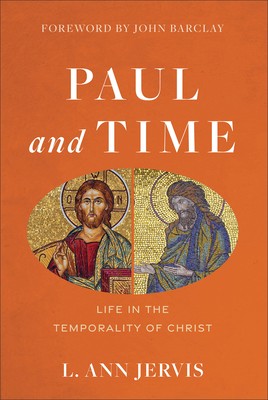
- We will send in 10–14 business days.
- Author: L Ann Jervis
- Publisher: Baker Academic
- ISBN-10: 1540960781
- ISBN-13: 9781540960788
- Format: 15.5 x 23.1 x 2.5 cm, kieti viršeliai
- Language: English
- SAVE -10% with code: EXTRA
Reviews
Description
How did Paul understand time?
Standard interpretations are that Paul modified his Jewish apocalyptic sequential two age temporality in light of Christ's resurrection, resulting in a concept of the overlap of the ages. Ann Jervis instead proposes that Paul understood Christ's resurrection and its effect on believers' temporality as allowing them to live the time of the risen and exalted Christ. Believers live entirely in Christ, liberated from the present age. Christ's temporality is time that is tensed, though the tenses are nonsequential. Christ's past is in Christ's present, as is Christ's future. The lives of those joined to Christ, while in chronological time, are enveloped and structured by Christ's temporality.
Jervis's interpretation has significant impact on our reading of Paul's understanding of believers' suffering, sin, and physical death, and of the eschaton. Scholars and students will profit from this lively contribution to Pauline studies. Foreword by John Barclay.
EXTRA 10 % discount with code: EXTRA
The promotion ends in 21d.20:25:29
The discount code is valid when purchasing from 10 €. Discounts do not stack.
- Author: L Ann Jervis
- Publisher: Baker Academic
- ISBN-10: 1540960781
- ISBN-13: 9781540960788
- Format: 15.5 x 23.1 x 2.5 cm, kieti viršeliai
- Language: English English
How did Paul understand time?
Standard interpretations are that Paul modified his Jewish apocalyptic sequential two age temporality in light of Christ's resurrection, resulting in a concept of the overlap of the ages. Ann Jervis instead proposes that Paul understood Christ's resurrection and its effect on believers' temporality as allowing them to live the time of the risen and exalted Christ. Believers live entirely in Christ, liberated from the present age. Christ's temporality is time that is tensed, though the tenses are nonsequential. Christ's past is in Christ's present, as is Christ's future. The lives of those joined to Christ, while in chronological time, are enveloped and structured by Christ's temporality.
Jervis's interpretation has significant impact on our reading of Paul's understanding of believers' suffering, sin, and physical death, and of the eschaton. Scholars and students will profit from this lively contribution to Pauline studies. Foreword by John Barclay.


Reviews